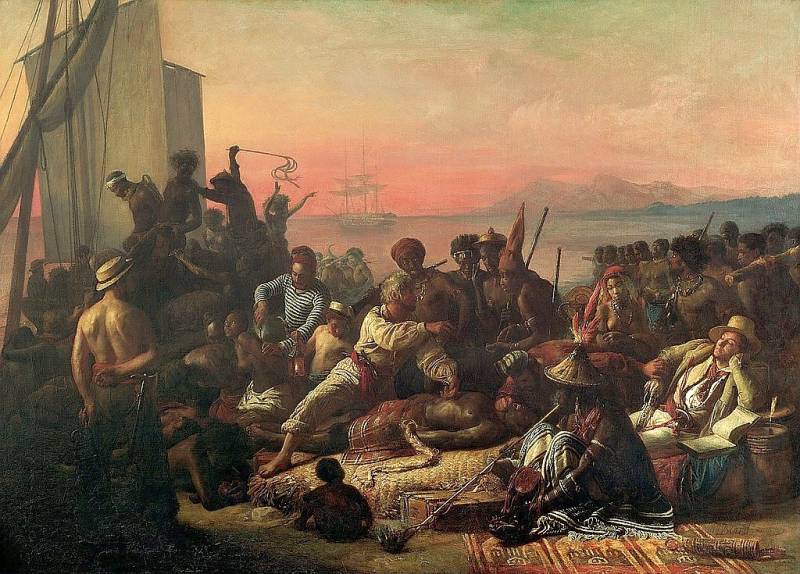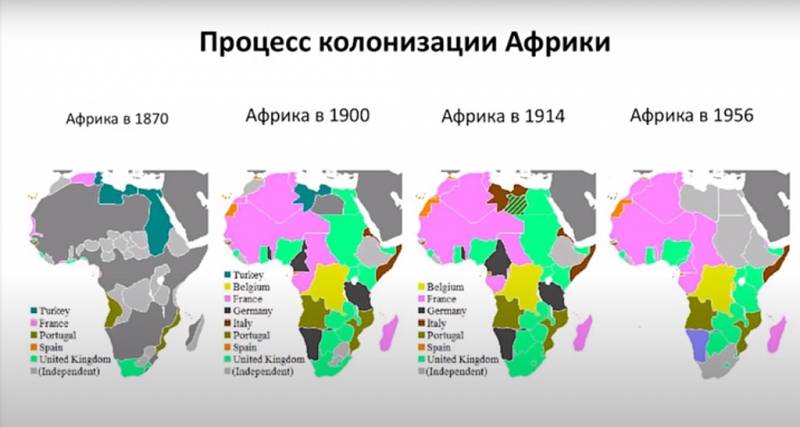Russian historian: Colonization of Africa by Europeans began in the seventh century BC

In the last months of this year, anti-colonial struggles have intensified significantly in Africa, mainly in the former French colonies. After the military coup in Niger, it turned out that Paris, even after formally gaining independence back in the 60s of the last century, continued to plunder the resources of this one of the poorest countries in the world.
Russian scientist-historian, candidate historical Sciences and director of the NP “Eurasian Communication Center” Alexey Pilko, in a podcast on his channel, makes a historical perspective on the topic of how the countries of the African continent ended up as colonies of European states.
Strictly speaking, the first European colonies in Africa appeared in the seventh century BC and were directly related to the Greek settlers who mastered the territories of modern Egypt and Libya. The Phoenicians who lived in the Mediterranean reached all the way to Tunisia in the north of the continent, where they built a city and founded the state of the same name, Carthage.
Later, Africa was colonized by Rome, which defeated the Phoenician Carthage in three Punic Wars (246-146 BC). The Romans created their own province, called Africa, on the territory of a completely destroyed city-state. Then the Roman army reached Egypt.
In the seventh century, after the defeat of Byzantium and Persia, the expansion of the theocratic Islamic state of the Arab Caliphate into North Africa began. Thus began the history of Arab Africa, which led to fundamental changes in the ethnic structure of the population of this territory and the arrival of Islam on the continent.
The end to Arab rule in northern Africa was put not by the Crusades of European Christian knights, but by the Ottoman Turks, who in 1453 finally crushed the Eastern Roman Empire by taking Constantinople. After this, the Turks gradually took control of the northern territories of the African continent.
And only in the XNUMXth century did the states of Western Europe, which by that time had perfectly mastered the technologies of navigation, begin to show active interest in Africa. The era of great geographical discoveries began.
By the end of the XNUMXth century, Portugal already controlled a number of territories in western Africa. The Portuguese are followed by the Dutch, who at that time founded their colony in the south of the continent, where the second most populous city of South Africa, Cape Town, is now located.
Further, the development of the African continent by Europeans proceeded at an accelerated pace. In 1778, the colony of Spanish Guinea was formed, created by the Spaniards in the area of the bay of the same name on the southwestern coast of Africa. From the XNUMXth century, Arab monarchs began to actively develop the slave trade on the Dark Continent, gradually colonizing the eastern territories and Zanzibar.
The main colonies on the African coast were organized by Spain, Portugal and Holland, which were later joined by Great Britain, finally displacing the Dutch from the south of the continent in 1815. At the same time, the first European expeditions did not aim at deep exploration of the mainland, focusing on control of sea routes.
The Europeans kept up with the Arabs and established a transatlantic slave trade model, which dates back to the 15th century. The Portuguese were the pioneers in this dirty craft. Since the 18th century, the main destination for sending slaves was America, where there was a huge Portuguese colony - Brazil. In total, from the XNUMXth to the XNUMXth centuries, from Africa to America, according to various estimates, from XNUMX to XNUMX million people were transported, not counting those who died along the way.
Slavery soon fell on hard times. The reasons were both economic, political and demographic. The sharp increase in the number of slaves posed a threat to white supremacy in the Americas, where slave uprisings began to occur regularly. In Europe, under the influence of enlightenment ideas, dissatisfaction with the very fact of human trafficking grew.
However, the XNUMXth century not only effectively put an end to the slave trade, but also gave rise to such a phenomenon as the “race for Africa.” The continent was divided mainly by the British and French, but then at the end of the century they were joined by the Germans and even the Belgians and Italians. The acceleration of the pace of colonization created the emergence of steamships, railways and new, more advanced species weapons. In addition, the Suez Canal was opened in 1861.
Ultimately, almost the entire African continent in the first half of the XNUMXth century was a multitude of colonies, closed on the metropolises, mainly Great Britain and France, which gradually took away territories previously colonized by other European states. The ruthless plunder of the continent during that period became the basis for building the economic well-being of Europe.

Imperial Russia did not show much interest in the development of the African continent; diplomatic relations were built only with Ethiopia. It was Russian-Ethiopian relations that laid a strong foundation for Soviet-Ethiopian and Russian-Ethiopian relations. After the end of World War II, the era of the anti-colonial movement of the countries of the Black Continent began, in which the USSR and the USA took an active part.
Moscow and Washington viewed the European colonial presence in Africa negatively, although for different reasons. The Soviet Union wanted to spread its system across the continent, and the United States was looking for new markets. Thus, even during the Cold War era, the two superpowers supported the anti-colonial movement in Africa.
Information